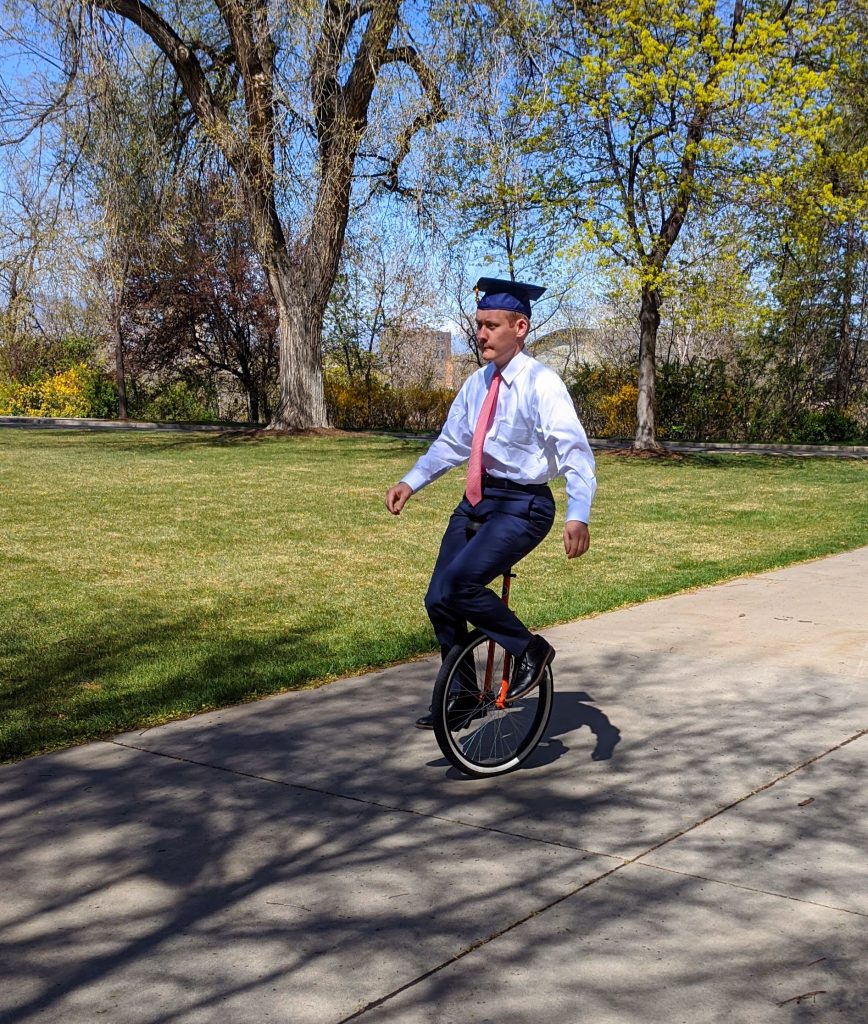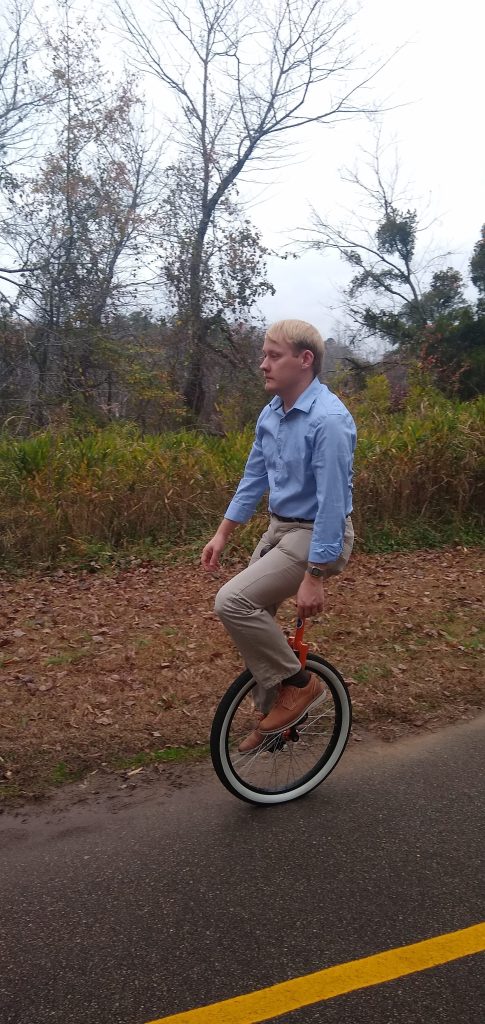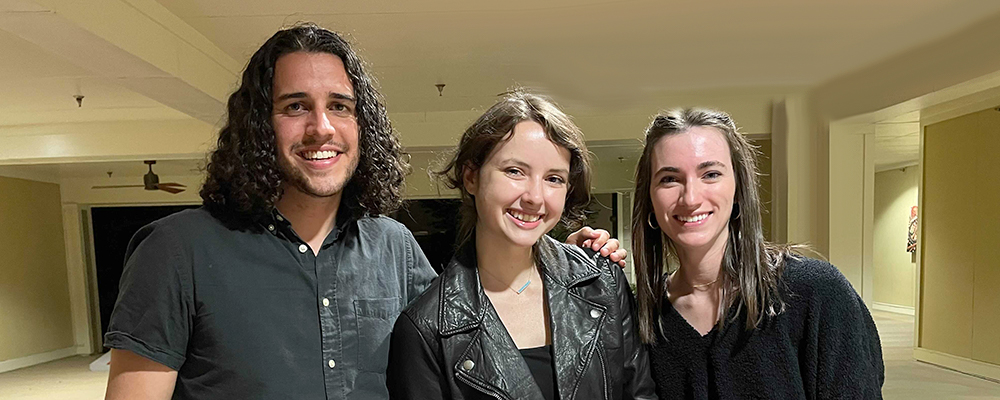After hundreds of miles traveled on a single wheel, and almost six months of the MSA program behind me, I’ve learned that academic success at the Institute for Advanced Analytics is built on the same principles as exploring a new path on a unicycle: developing skill through practice, maintaining focus and balance, and putting in consistent effort.
How I Started Unicycling

Brigham Young University, where I went for undergrad, is a pedestrian- and bike-friendly school, but it doesn’t have a lot of options for automobile traffic. In fact, I didn’t own a car during my entire undergraduate education. Depending on how close to campus I lived and how much time I had, I would either walk or bike to all my classes. Commuting by bike was quick and convenient, but it was also a bit of a chore. On the other hand, walking was slow, but more enjoyable. At the beginning of my senior year, I began unicycling, and I discovered that this method of transportation combined the pleasure of walking with the convenience of biking.
I didn’t really know anything about unicycling before I got one of my own and started practicing on it. Like most people, I considered it an unusual talent, and I had no clue how easy or difficult riding one would be. But I like to think of myself as being a bit odd and up for a challenge, so I researched what to look for in a “commuter unicycle” and started practicing on mine in early September of 2021.
After my first fifteen minutes of practice (just trying to get up onto the seat without hurting myself), I was regretting not having also bought some shin guards. But over the next couple of months, I learned how to get and stay on the unicycle, move forward while balancing against a wall, balance without support, and turn. Finally, by mid-November, I was comfortable enough to start commuting to my classes on the unicycle. I traveled at roughly a jogger’s pace while expending about as much energy as I would walking. It quickly became my favorite mode of short-range transportation and a great way to spend leisure time.
Practice, Balance, and Forward Momentum
Like most things worth learning, unicycling is all about consistent practice, maintaining balance, and continuing to move forward (a unicyclist’s momentum comes primarily from leaning forward, not from the motion of the pedals). You might be thinking, “all of those things also apply to riding a bike like a normal person. What makes a unicycle so different?” I’ll get the obvious difference out of the way: 94% of Americans can ride a bike, but odds are that you don’t have a close friend who rides a unicycle. But to the main point, a bicycle has one specific characteristic that makes it a flawed metaphor for success. Allow me to present a situation to illustrate this key difference.
Picture yourself on a casual bike ride. You encounter a section of the path that’s uneven, where tree roots have upheaved the asphalt. It’s short enough to see past it to where the road evens out, but it amounts to more than just a few bumps in your path. How do you respond to this?
A typical course of action would probably be to stop pedaling, stand up off the seat to reduce discomfort, and coast until you’ve reached the other side.
Now picture me on my bright orange unicycle coming to the same section of path. This situation is not one I look forward to. My vehicle is incapable of coasting, so I have to keep pedaling, and I don’t have the option of moving much weight from the saddle to my feet. Doing so would quickly make my leg muscles start to burn and, more importantly, would reduce my control of the unicycle. All I can do is grab the seat to shift just a little pressure to one of my hands, and laser focus on what’s right in front of me to identify a route across this section of trail that will minimize the shock from each bump.
Coasting – Not for Unicyclists or IAA Students
The distinguishing characteristic of a riding bicycle that makes it dissimilar from many other tasks is the ability to coast; a cyclist can continue to make substantial forward progress even if they stop putting in effort for a time. In most real-world cases of working towards a goal, however, even a brief stop can have a lasting negative impact on the quality of outcomes. Thus, a unicycle is a much more apt metaphor than a bike.

A lapse in focus or a cessation of effort on the part of a unicyclist is likely to result in a loss of balance and a potentially painful dismount. Similarly, because of the intensity of the analytics master’s program at the IAA, success is dependent on maintaining focus and putting in consistent effort. A strong background in statistics or programming won’t give you the ability to coast, as this is more akin to having some previous unicycling experience than to riding a bike. Nor will being paired with strong homework team members mean that you can take a term off, though it might mean that you have a smoother path ahead of you for a bit.
While you can never coast on a unicycle, it’s important to recognize that in the situation presented earlier, slowing down was a vital part of my approach to navigating the rough section of path. We encounter difficult stretches on whichever paths we take, and sometimes slowing down is the appropriate way to respond. Moving slowly on a unicycle can be difficult because it requires greater balance, focus, and strength to make up for the decrease in forward momentum. It can be done, but only for so long.

Fortunately at the IAA, when we encounter difficulties caused by confusing concepts, overwhelming assignments, or personal challenges, we don’t have to balance alone on one metaphorical wheel. We have faculty and classmates—including homework and practicum team members—to help us as we traverse challenging paths.
Columnist: Isaac Peterson
